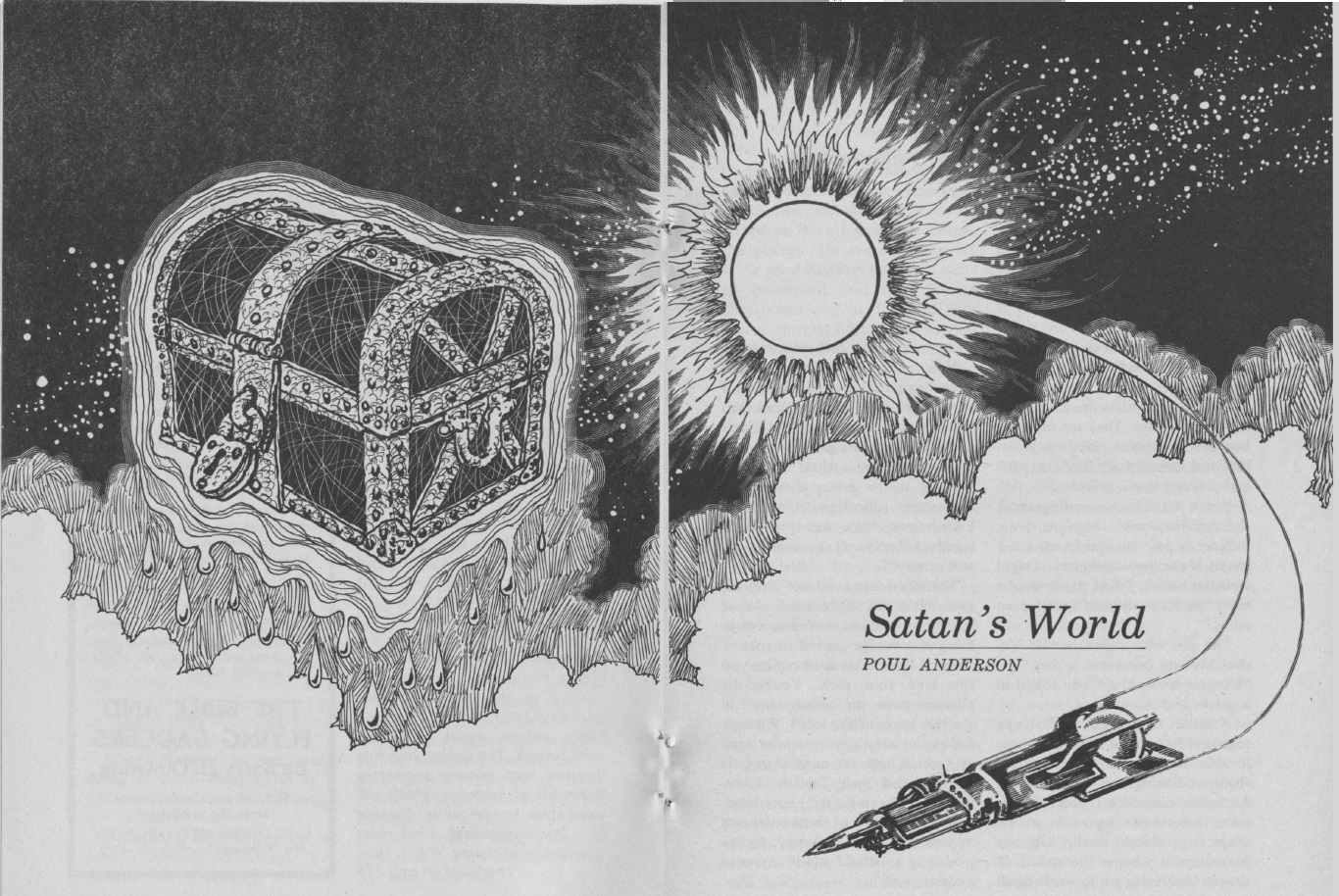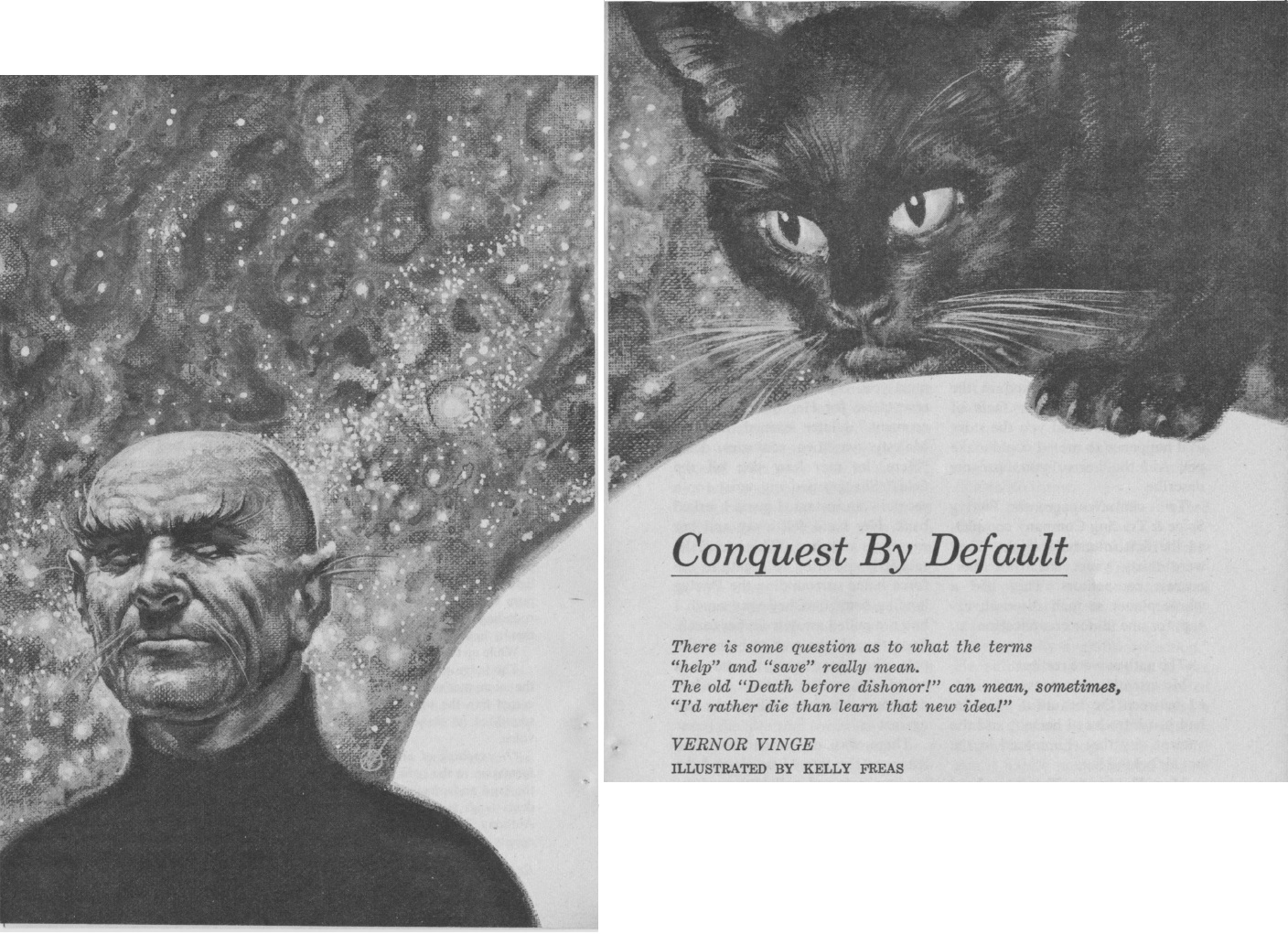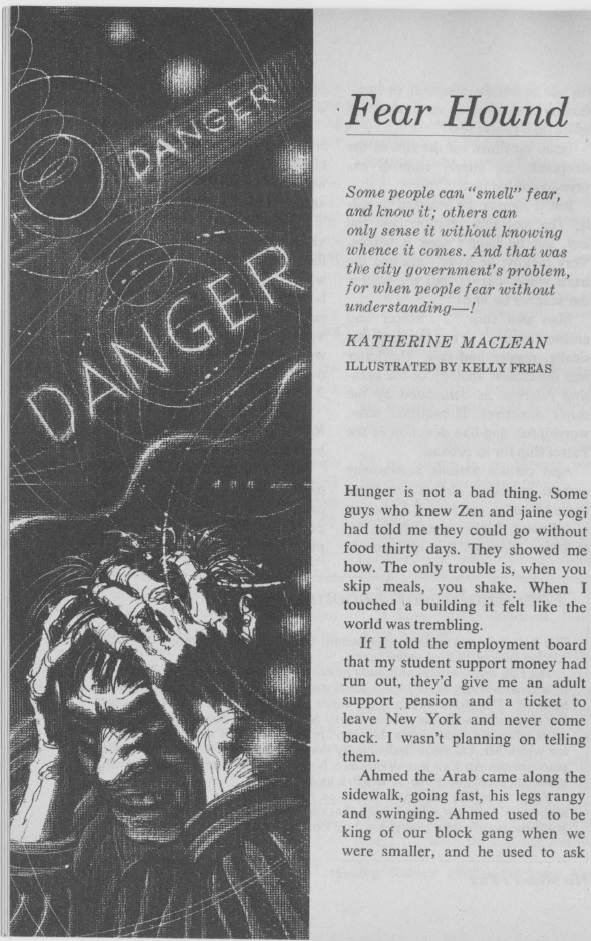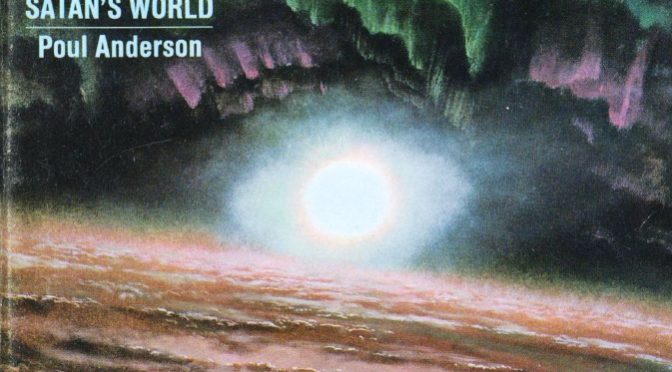
by Gideon Marcus
Chertona Dyuzhina (Baker's Dozen)
Luna 14 is the Soviet Union's latest space success story. Launched April 7, it slipped into lunar orbit a couple of days later and began relaying data. Per TASS, the spacecraft is still working fine, returning space weather reports and mapping the moon's hidden contours through the wobbling of its path due to lunar gravity.

No pictures have been returned, nor has there been any mention of an onboard camera. However, since Luna 12 (launched October '66) did have one, it is generally believed that Luna 14 has one too–and it broke. We'll probably never know.
Campbell's Seven
The latest issue of Analog is also not an unmixed bag. However, it's still the best issue of the mag by a long shot since January. That's something worth celebrating!

by Chesley Bonestell
Satan's World (Part 1 of 4), by Poul Anderson
David Falkayn is back! The fair-haired protoge of Polesotechnic League magnate Nicholas van Rijn has been sent to Earth to find untold fortune. More specifically, to inquire at Serendipity Inc., storehouse of all the universe's lore, for the quickest route between Point A (Falkayn) and Point B (wealth). It's amazing what can be done with computers in the Mumblethieth Century!

by Kelly Freas
To do so, he puts himself at the mercy of the board of Serendipity, becoming a guest on their lunar estate. His crewmates, Adzel the monastic saurian who talks like Beast from The X-Men, and Chee, who talks like Nick Fury from Sgt. Fury, stay behind…and worry.
With good reason, for Falkayn has been shanghaied, purportedly in love with one of the Serendipity board, but probably brainwashed or something. Van Rijn gives Adzel and Chee the green light to investigate.
Falkayn stories are always somewhere in the lower middle for Anderson–serviceable but unexciting. Once again, the author utilizes some cheap tricks to move things along, even calling them out in text in an attempt to excuse them (the long explanation of Serendipity's modus operandi; the sudden coincidence of a call by a critical character, etc.) None of the characters is particularly interesting, perhaps because of the extremely broad brush with which they're described, particularly Van Rijn.
Nevertheless, mediocre is pretty good for a Falkayn story, and I'm kind of interested. Plus, Anderson's astronomy is always pretty good.
Three stars so far.
Exile to Hell, by Isaac Asimov

by Kelly Freas
This story is remarkable for being the first time Isaac has appeared in Analog (the magazine was Astounding when wrote for Campbell). It is otherwise unremarkable–this vignette is written in '40s style, with a hoary "twist" ending, which was already incorporated as one of many elements in The Moon is a Harsh Mistress.
Two stars.
Conquest by Default, by Vernor Vinge

by Kelly Freas
This one surprised me: alien anarchists, who by their law are forbidden to have polities larger than 10,000 people, take over a recovering post-nuclear Earth. The Terrans are worried that they will suffer a fate similar to that of the Cherokees–annihilation, assimilation, relocation, or a combination of all three.
Told from the point of view of one the conquerers, it very much seems like this will be one of those fatuous Campbellian tales where it turns out that free enterprise and libertarianism are the superior forces, and that the solution to "the aboriginal problem" has a neat and obvious solution.
But the story has a sting in its tail.
I had not expected to find an anti-capitalist, anti-libertarian screed in the pages of Analog, much less an acknowledgement of the American genocide…yet there it is! And because the viewpoint character is an alien (and a comparatively sympathetic one, at that), the full impact of the story is saved for the end.
Four stars.
His Master's Vice, by Verge Foray

by Kelly Freas
Prox(y)ad(miral) Elmo Ixton lands his patrol ship, the sentient craft, Rollo, on the planet of Roseate on the trail of a rebel proxad who has gone to ground and recruited a network of criminal accomplices. The agoraphobic and irritable Ixton ingratiates himself with very few people, but he does get his man…in time for the tables to be turned when the renegade takes over his ship.
Luckily, Rollo is not about to become an unwitting accomplice.
Not bad. I didn't much like the Gestapo methods with which the "good guys" extracted the truth from suspects, though.
Three stars.
Fear Hound, by Katherine MacLean

by Kelly Freas
In late 20th Century New York, the city seethes with a despair so palpable, it almost seems the echoes of one person's broadcast pain. Indeed, that is exactly what it is. And the Rescue Squad, a corps of intellectual empaths, are on the case to find the source before s/he perishes in anguish, and in the process, telepathically pushes hundreds, maybe thousands more, to the brink of insanity or even death.
There's a lot of neat stuff in this one. Obviously, you have to buy telepathy as plausible (something Campbell obviously does). Given that, the idea of a group of people tracking down injured folk by their subtle telepathic emanations, and the unconscious mass effects these have on others, is pretty innovative. MacLean writes in the deft, immediate style that has made her one of SF's leading lights for two decades; the dreamy, choppy execution fits the circumstances of the story.
On the other hand, the bits about smart people essentially providing the brain for dozens of sub-average IQ types through unconscious telepathic links was something I found distasteful. There are also a few, lengthy explainy bits that could have been better worked in, I think.
A high three stars.
Project Island Bounce, by Lawrence A. Perkins

by Kelly Freas
The alien Ysterii arrive on an Earth not unlike that depicted in Conquest by Default. Here, the crisis is that the blobby amphibians prefer the archipelagos of Asianesia to the dry expanses of Eurica. This is causing a trade imbalance that will ultimately not only destabilize the world, but potentially lead to a cut-off of peaceful relations with the galaxy altogether.
Perkins doesn't tell the story very well, especially compared to Vinge's writing, and the "solution" is dumb. Two stars.
Skysign, by James Blish

by Leo Summers
Carl Wade, a Berkeley radical type finds himself trapped on an alien vessel floating above San Francisco. As memory returns to his headachey brain, he recalls the he was the one "lay volunteer" among dozens of men and women chosen as ambassadors for their various technical expertise.
Now, Carl and a hundred-odd humans are prisoners in the gilded cage of the ship, offered all manner of food and a fair bit of recreation. But they are nevertheless under the control of the alien crew, humanoids in skintight suits, with the ability to teleport and put the human captives to sleep at any time.
That is, until Carl, with the help of the Jeanette Hilbert, a brilliant meteorologist, figure out how to wrest control of the whole system from the aliens. That's only half the story, since Carl and Jeanette have differing ideas on what to do with absolute power.
I liked this story, and Blish does a good job of putting us in the boots of a not-entirely savory character. I find it particularly interesting that our radical protagonist is something of a jerk; I originally thought that this might be a subtle, anti-leftist dig, but Blish is an outspoken peacenik, so I think he just wanted to create a nuanced character.
Four stars.
Batting Average

Analog thus ends up at a reasonable 3.1 stars–not stellar, but certainly worth the 60 cents you pay for it (less if you have the subscription, of course). That puts it at the bottom of the new mags (vs. IF and Fantasy and Science Fiction (3.5), but better than the reprints (Fantastic (2.7) and Amazing (2.0)). The magazine average for the month was 3.1.
All told, if you took the four and five star stories of this month and squished them into one mag…well, you'd need one and a half. That amounts to about 40% of all new fiction this month. Again, not bad.
The sad news is only one story this month was woman-penned, making up for 4.3% of the newly published works. And that one was MacLean's, meaning Analog wins this month's pink ribbon in a mass forfeit.
Well, I suppose you take your victories where you find them. At least we ended up on the positive side of the ledger this month…



Well, I certainly wouldn't have ended the sentence "David Falkayn is back" with an exclamation point. What's the exact opposite of that? As you say, it's mediocre Anderson, which is slightly above average mediocrity. Part 2 might be more interesting with Falkayn apparently out of commission. Adzel, Chee and even Muddlehead are much more interesting characters than he is.
"Exile to Hell" was tedious and utterly predictable. I knew the ending only a few paragraphs in. I can only assume that Campbell has been pestering Asimov for a story, and this was accompanied by a note that read, "Here, John. Now stop bugging me!"
"Conquest by Default" was pretty good. Vinge is improving as a writer, and from a fairly good starting position. He's probably one to watch. As for this story, I can only conclude that Campbell either didn't understand it or thought Mack Reynolds wrote it. Maybe both.
"His Master's Vice" was enjoyable, even if the proxads all seem like terrible people. It was a bit forgettable, though.
"Fear Hound" was very good. Another editor might have been able to get MacLean to polish this to four star status. I wonder if she'll do more with this setting. The ending could imply further stories, or it could just be a bit of optimism that things are going to work out all right for the protagonist.
"Island Bounce" was bad and clearly written to check off enough of Campbell's boxes to get him to buy it. Those things are probably connected.
"Skysign" certainly featured an unpleasant character. Unlike you, I'm not entirely sure Blish saw him that way. I honestly don't think I could give this one four stars.
There's something else that really helped out this issue. There was no fact article that was either dry as dust or was all about complete nonsense. Even the editorial wasn't completely awful.
Per Isaac, he actually wrote it for the ailing Saturday Evening Post. They rejected it, and Campbell may have taken the story out of sentimentality/space concerns/name recognition.
I skipped the Anderson, don't feel I need to waste my time reading any more of those adventures.
Your thoughts on the Asimov are bang on. It feels very much like something that could have been printed 30 years ago.
The Vinge was definitely interesting, I think I liked it even a little more than you did, although for similar reasons. One thing I kept pondering throughout my reading was why the so many of the names seemed to be Welsh. Was it just to reinforce the themes?
His Master's Vice I was less enamoured with. There just wasn't much in it that worked for me and I found my attention wandering often.
I think you are right with the MacLean being a high three stars. She is a talented writer but some of the choices felt more designed to appeal to Analog sensibilities than good story choices. Also, curious to note that they had an Arab as the lead character here. I am beginning to wonder if Campbell was taking a holiday when this issue was put together?
The Perkins was just not very good at all.
As usual Blish didn't really work for me. I think as an author he is just not for me.
At least this issue isn't completely full of writers who only appear in Analog.
Wow, Kelly Freas is really doing a lot of good work!
Say what you want about the content, but the cover art is first rate!
Once again my copy seems to have gone astray. Hope it hasn't been sent to another address…
Your neighbor should be giving you a call…
I must admit I like the Asimov story (which I read in his collection Buy Jupiter) and almost all the science fiction I've read by him. I like the variety of themes and ideas in his stories. I don't care much if the style is old-fashioned.